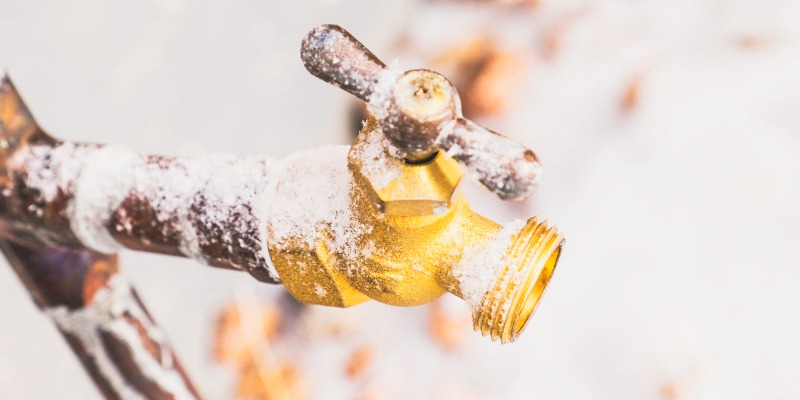Have you ever come home from work one day to find your bathroom or kitchen flooded? Dealing with this kind of mess is stressful, especially when insurance companies are involved. When this happens in winter, it usually means that a pipe has frozen and burst.
Most of the time, frozen pipes can be avoided by preventing the pipes from getting cold enough for the water inside to freeze. When this is not possible, as is the case with an outdoor sprinkler system, you will need to drain the pipes and shut off the water supply until spring.
How to Keep Your Pipes from Freezing
Any pipe that gets cold enough will freeze eventually. If the pipe is carrying water, the water will solidify and expand upon freezing. The blockages that result create a build-up of pressure that causes the pipe to burst. When outdoor air temperatures plummet, a water pipe that is not sufficiently insulated will freeze.
On the other hand, indoor pipes that are surrounded by plenty of insulation are not as vulnerable to freezing. Typically, most homes built in colder climates are designed so that most of the water lines and pipes are surrounded by adequate insulation to prevent pipes from freezing.
Water lines that run through garages are notorious for freezing pipes. Many builders will not put much insulation into garages, even in colder climates. This is perfectly fine, so long as there are no pipes travelling through the garage. In some cases, garages have hoses that run through them, typically the problem can be prevented by always remembering to keep the garage door closed. If your pipes are freezing even when the garage door is closed, you should consider insulating your garage. The advantage of this is that the garage insulation is also acts as a water line insulation.
What to Do With Frozen Pipes
If you turn on the faucet in winter and no water comes out, it could be a frozen pipe. The key thing is to relieve the pressure inside the pipe immediately to prevent a burst. When a faucet is left turned off, the pipe becomes sealed shut via the faucet’s valve. Pipes usually burst because the pipe is not in use right when the freezing happens. If you leave the faucet turned on just slightly, this will relieve any pressure and prevent a burst. After this, warm the pipe with a blow dryer, space heater or heating pad. As it warms up, you should hear dripping because water is starting to flow. Avoid using an open flame to heat a frozen pipe.
How to Winterize your Sprinkler System
Sprinkler systems use water lines that are underground, which means they will freeze when there is frost on your lawn. To prevent freezing pipes, you can introduce antifreeze or blow the lines out after you turn the sprinkler system’s supply valve off.
If you are concerned about winterizing your sprinkler system, reach out to a trusted professional on Baeumler Approved for help!
Get Expert Assistance
Hopefully, this article has given you a better understanding of how to prevent and avoid frozen pipes. If there is a burst, reach out to an expert listed on Baeumler Approved to clean up the mess.

